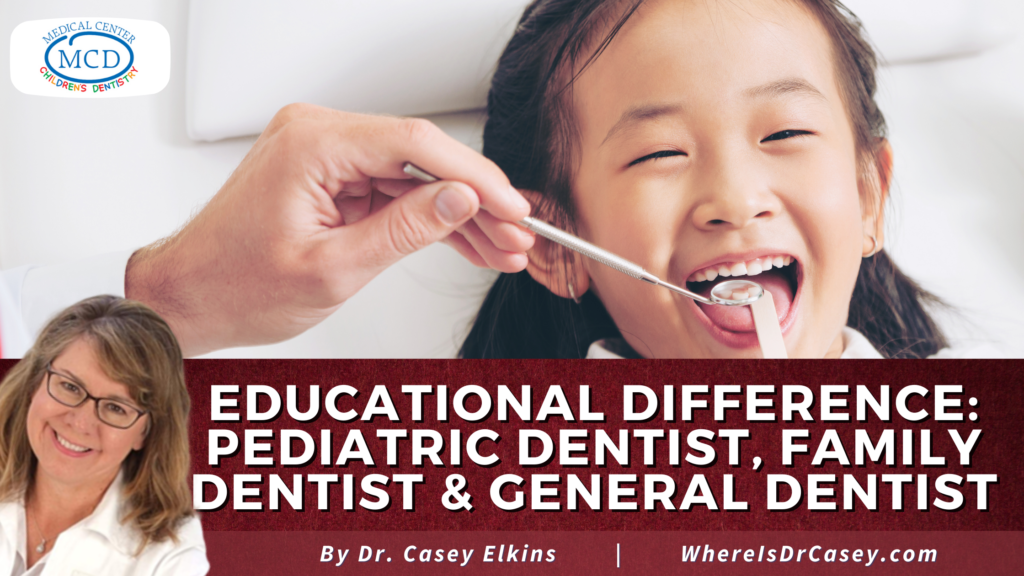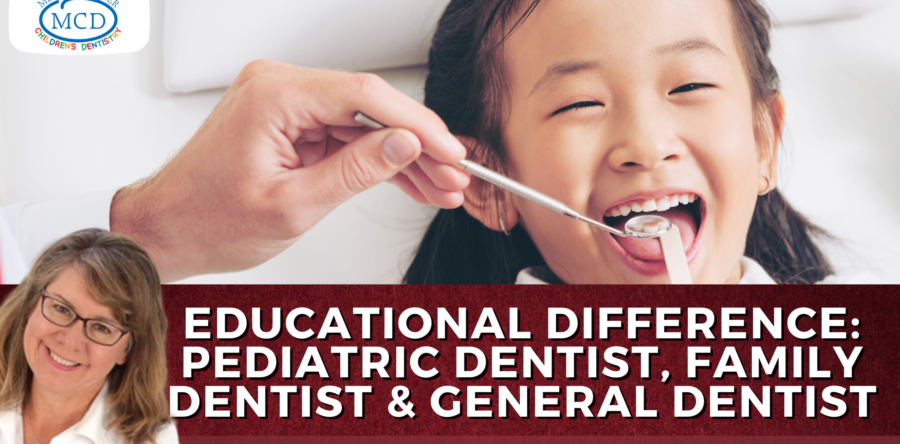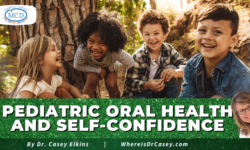
As a parent trying to set your child up with the best dental care, you may find yourself wondering what the difference is between the General Dentist you see and a Pediatric Dentist. The truth is that Pediatric Dentists do an additional two years of specialized training after dental school. So which type of dentist is better for your child? It depends on your personal preference, as well as your child's dental needs. We believe the best way to make these decisions is through education and knowledge. This is a quick guide put together by Pediatric Dentist, Dr. Casey Elkins, to help you know more about the options you have for your child's dental care.
The Educational Differences Between Pediatric Dentists, Family Dentists, and General Dentists.
Some General Dentists will use the term "Family Dentist" to market themselves to potential patients that they treat both adults and children. General Dentists and Pediatric Dentists have both done the same 4-year graduate dental program and then earn their state dental licenses. However, Pediatric Dentists continue with an additional two years of specialized schooling aimed at treating pediatric dental needs. They are taught how to treat these younger patients, while also easing their anxieties too.
This 2-year residency program focuses on treatments specifically associated with pediatric patients. According to the American Academy of Pediatric Dentistry, a Board-Certified Pediatric Dentist's training includes, "the trainee learning advanced diagnostic and surgical procedures, along with child psychology and clinical management, oral pathology, child-related pharmacology, radiology, child development, management of oral/facial trauma, care for patients with special needs, conscious sedation and general anesthesia."
What Does It Mean To Be A "Board-Certified Pediatric Dentist?
Board-Certified Pediatric Dentists, such as our own Dr. Casey Elkins, are pediatric dentists who have completed the additional step of passing both the American Board of Pediatric Dentistry's oral and written examinations. Pediatric Dentists who pass the oral examination demonstrate their mastery of pediatric dental clinical skills. Equivalently, passing the written examination demonstrates their knowledge of cutting-edge pediatric dental literature, as well as the scientific and biological principles necessary to succeed in their field of pediatric dentistry.
By choosing to become Board-Certified, these Pediatric Dentists show their commitment to continuing their education and lifelong learning. They demonstrate their dedication to providing quality patient care even for society's youngest patients. This additional credential even offers Board-Certified Pediatric Dentists certain hospital privileges as well. This allows them to offer the best care based on each individual patient's needs.
The Benefits of Taking Your Child to a Pediatric Dentist
There are a variety of benefits of choosing to take your child to see a Pediatric Dentist. Some of them are more obvious than others. Here are a few that we believe make the most difference in a child's dental care.
Pediatric Dentists Are Experts in Treating Child-Specific Dental Issues.
The reason that Pediatric Dentists go through two extra years of specialized training is due to the fact that children have different dental issues than grown adults. Pediatric Dentists, much like Pediatricians, are knowledgeable in treating needs specific to children. Some parents may wonder how much of a difference a child's dental needs might be compared to those of their own. Honestly, they may be surprised to learn just how different they actually can be.
Since a child's mouth is still developing, Pediatric Dentists are constantly looking for ways to address specific dental issues a patient may have, while also considering how it may affect the future growth and development of their teeth. Pediatric Dentists are trained to know when and how to intervene early to prevent more serious problems in the future. They only use treatment methods that are appropriate given a child’s age and stage of oral development.
The anatomy of a primary tooth, also known as a "baby tooth," is very different from that of a permanent tooth or "adult tooth." Pediatric Dentists have spent years studying the anatomy and development of these primary teeth. Through their work and studies, they have ample amount of experience dealing with baby teeth as well. Pediatric Dentists are also specially trained to perform procedures in ways that are specific to primary teeth and immature permanent teeth. For example, some procedures are only performed on primary teeth and permanent teeth whose roots are still immature. Some General Dentists may not have the experience or knowledge to feel confident to perform some child-specific treatments.
Some of these dental issues that are seen exclusively or primarily in children include treating things such as natal teeth (teeth present at birth); babies born with a tongue-tie that has caused difficulties nursing; and early childhood caries (tooth decay in children under age six) which is an especially aggressive form of tooth decay that can quickly lead to serious complications if left untreated. Pediatric Dentists are specially trained to recognize and treat these specific types of issues which often require specialized care. Since they only see pediatric patients, they are always focused on looking for these specific dental issues.
Pediatric Dentists Understand Kids and Their Behavior!
The experience of going to the Dentist and being in a dental office is different for children than it is for adults. Thus, it isn't surprising that they can react differently than we might expect that they would. Pediatric Dentists are trained in child psychology and behavior guidance techniques specifically to help put children and their fears at ease. This is especially important for patients who have anxiety, regardless of how rational or irrational their fears may seem. This is one of the reasons we offer a variety of resources for our patients who may feel anxious about an upcoming visit. The goal of Dr. Casey and Medical Center Children's Dentistry is to cultivate a positive experience for children with a wide range of temperaments and developmental levels.
Pediatric Dentists are also trained on how to effectively educate children about their own oral health using developmentally appropriate language. They are trained in how to help parents transfer this knowledge into good, lifelong oral habits at home. Being able to effectively explain oral health information to both the parents and their child, increases the child's chances for developing these important habits. We have found that this helps both patients and parents understand the true importance of good oral hygiene and how to practice it.
Pediatric Dental Office Are Designed With Kids In Mind.
Pediatric Dental offices, such as Medical Center Children's Dentistry, are specially designed to be kid-friendly environments. A lot of thought and effort goes into making sure our office doesn't increase a patient or parent's anxiety as well. Family Dentists and General Dentists traditionally sytle their offices to cater to their adult patients, which can unfortunately also cause increased anxiety in some younger patients. Since Pediatric Dentists only treat children, they have the freedom to cater their office experience just to them... and their parents too, of course!
Dr. Casey has put a lot of care into choosing the theme and design behind Medical Center Children's Dentistry's experience. The Charlotte's Web-themed office creates a comfortable and recognizable environment for everyone. Here are a few of the elements in the office that Dr. Casey has added to ensure children have a fun, positive experience.
- Child-friendly décor and furniture in their private waiting room
- Hand-painted, Charlotte's Web themed exam rooms using calming colors
- A TV in each exam room with access to age-appropriate entertainment options
- A private children's waiting room for families, as well as a waiting room for adults too
- Video games and children's toys for patient entertainment in children's waiting room
- Specialized tools and characters for demonstrating good oral hygiene to young children
- Prizes and rewards after each visit, making the completion of exams extra exciting
- Dental hygiene products to take home including toothbrushes, toothpaste, dental floss, and more
As you can see, everything about the experience at Medical Center Children's Dentistry is focused on a positive, enjoyable visit for our patients and their parents. We take this very seriously, as we aim to create a beneficial, understanding, and educational environment.
How Can A Parent Tell If A Dentist Is a Pediatric Dentist?
Only true Pediatric Dentists, who have done the two-year pediatric residency program outlined by the American Academy of Pediatric Dentistry, should be marketing themselves as such. However, sometimes it can be confusing to understand some of the language used to advertise Dentists. When trying to figure out if a Dentist is a Pediatric Dentist, these are some of the things that may be helpful to ask:
- Where did the Dentist complete their Dental Training and Pediatric Dental Speciality Training? A Pediatric Dentist must complete two years of specialty training after graduating from dental school as a General Dentist. Having this experience and specialized training is what makes them Pediatric Dentists.
- Does the Dentist treat both children and adults as patients? While Family Dentists see both adolescent and adult patients, Pediatric Dentists are specialists who only treat children. While this is true, Dr. Casey and Medical Center Children's Dentistry do have some lifelong, disabled patients. These are typically the only patients we will see into adulthood. If a Dentist only sees pediatric patients, they must be a Pediatric Dentist.
- Is the Dentist a Board-Certifed Pediatric Dentist? Only Pediatric Dentists can receive board certification from the American Board of Pediatric Dentistry. A Board-Certified Pediatric Dentist has completed an oral and written examination as dictated by the American Board of Pediatric Dentistry. These Board-Certified Dentists carry the title of “Diplomate of the American Board of Pediatric Dentistry.” Their websites and marketing will often include this label.
Other sources you can use to find out if a specific Dentist is a Pediatric Dentist is through the American Academy of Pediatric Dentistry. You can also see if they are a Board-Certified Pediatric Dentist through the American Board of Pediatric Dentistry. These websites have a variety of additional resources for the parents of patients to utilize as well.
Board-Certified Pediatric Dentist in San Antonio
Casey Elkins DDS is a Board-Certified Pediatric Dentist who completed her residency at the University of Texas Health Science Center in San Antonio. Through this residency and over 25 years as a practicing Pediatric Dentist, Dr. Casey gained experience working with a wide variety of pediatric patients, including those with Down syndrome, autism, cancer, rare syndromes, cleft lip/palate, craniofacial abnormalities, and dental trauma. She has had experience working with patients who have varying degrees of anxiety and fears as well.
Dr. Casey was voted one of the Best Dentists in Texas for the 10th straight year by Texas Monthly magazine and was nominated into the Texas Monthly Hall of Fame. She is also the Former President of the San Antonio Academy of Pediatric Dentistry. These are some of the many reasons that San Antonio parents have been trusting Dr. Casey with their children's oral health for over two and a half decades. You are always welcome to reach out to us at Medical Center Children's Dentistry, for questions or to schedule your child's next appointment!






